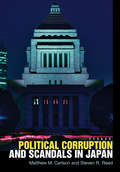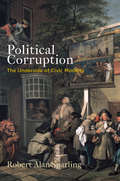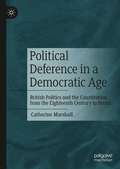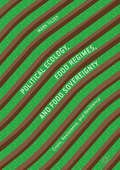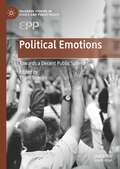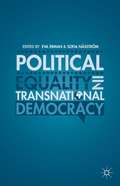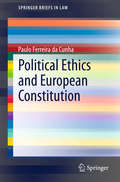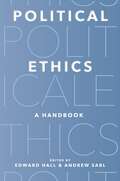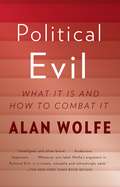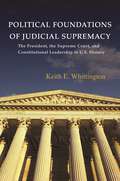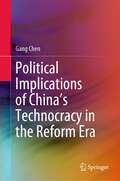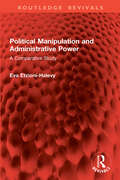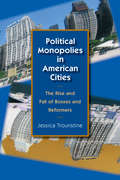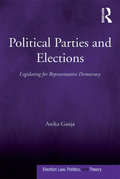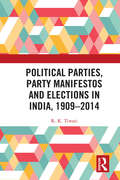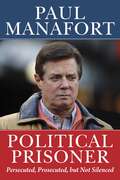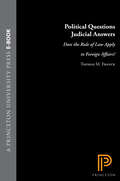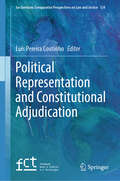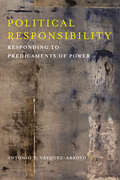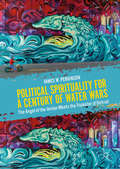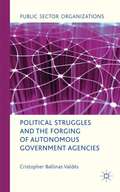- Table View
- List View
Political Corruption and Scandals in Japan
by Steven R. Reed Matthew M. CarlsonCombining history with comparative politics, Matthew M. Carlson and Steven R. Reed take on political corruption and scandals, and the reforms designed to counter them, in post–World War II Japan.Political Corruption and Scandals in Japan makes sense of the scandals that have plagued Japanese politics for more than half a century and attempts to show how reforms have evolved to counter the problems. What causes political corruption to become more or less serious over time? they ask. The authors examine major political corruption scandals beginning with the early postwar period until the present day as one way to make sense of how the nature of corruption changes over time. They also consider bureaucratic corruption and scandals, violations of electoral law, sex scandals, and campaign finance regulations and scandals.In the end, Carlson and Reed write, though Japanese politics still experiences periodic scandals, the political reforms of 1994 have significantly reduced the levels of political corruption. The basic message is that reform can reduce corruption. The causes and consequences of political corruption in Japan, they suggest, are much like those in other consolidated democracies.
Political Corruption: The Underside of Civic Morality (Haney Foundation Series)
by Robert Alan SparlingThe notion of corruption as a problem for politics spans many centuries and political, social, and cultural contexts. But it is incredibly difficult to define what we mean when we describe a regime or actor as corrupt: while corruption suggests a falling away from purity, health, or integrity, it flourishes today in an environment that is often inarticulate about its moral ideals and wary of perfectionist discourse. Providing a historical perspective on the idea, Robert Alan Sparling explores diverse visions of corruption that have been elucidated by thinkers across the modern philosophical tradition.In a series of chronologically ordered philosophical portraits, Political Corruption considers the different ways in which a metaphor of impurity, disease, and dissolution was deployed by political philosophers from the Renaissance to the early twentieth century. Focusing specifically on the thought of Erasmus, Étienne de La Boétie, Machiavelli, Montesquieu, Bolingbroke, Robespierre, Kant, and Weber, Sparling situates these thinkers in their historical contexts and argues that each of them offers a distinctive vision of corruption that has continuing relevance in contemporary political debates. He contrasts immoderate purists with impure moderates and reveals corruption to be a language of reaction and revolution. The book explores themes such as the nature of civic trust and distrust; the relationship of transparency to accountability; the integrity of leaders and the character of uncorrupted citizens; the division between public and private; the nature of dependency; and the relationship between regime and civic disposition.Political Corruption examines how philosophers have conceived of public office and its abuse and how they have sought to insulate the public sphere from anticivic inclinations and interests. Sparling argues that speaking coherently about political corruption in our present moment requires a robust account of the good regime and of the character of its citizens and officeholders.
Political Deference in a Democratic Age: British Politics and the Constitution from the Eighteenth Century to Brexit
by Catherine MarshallThis book explores the concept of deference as used by historians and political scientists. Often confused and judged to be outdated, it shows how deference remains central to understanding British politics to the present day. This study aims to make sense of how political deference has functioned in different periods and how it has played a crucial role in legitimising British politics. It shows how deference sustained what are essentially English institutions, those which dominated the Union well into the second half of the twentieth century until the post-1997 constitutional transformations under New Labour. While many dismiss political and institutional deference as having died out, this book argues that a number of recent political decisions – including the vote in favour of Brexit in June 2016 – are the result of a deferential way of thinking that has persisted through the democratic changes of the twentieth century. Combining close readings of theoretical texts with analyses of specific legal changes and historical events, the book charts the development of deference from the eighteenth century through to the present day. Rather than offering a comprehensive history of deference, it picks out key moments that show the changing nature of deference, both as a concept and as a political force.
Political Ecology, Food Regimes, and Food Sovereignty
by Mark TilzeyThis book asks how we are to understand the relationship between capitalism and the environment, capitalism and food, and capitalism and social resistance. These questions come together to form a study of food regimes and the means by which capitalism organises both the environment and people to provision its distinctive system of ever-expanding consumption with food. Political Ecology, Food Regimes, and Food Sovereignty explores whether there are environmental limits to capitalism and its economic growth by addressing the ongoing and inter-linked crises of food, fossil fuels, and finance. It also considers its political limits, as the globally burgeoning 'precariat', peasants and indigenous people resist the further commodification of their livelihoods. This book draws from the field of Political Ecology to approach new ways of analysing capitalism, the environment and resistance, and also to propose new solutions to the current agro-ecological-economic crisis. It will be of particular interest to students and academics of Environmental Sociology, Human Geography, and Environmental Geography.
Political Emotions: Towards a Decent Public Sphere (Palgrave Studies in Ethics and Public Policy)
by Thom BrooksHow might political emotions contribute to the creation of a decent public sphere? Our societies are characterized by difference and contestation. Cultivating political emotions can appear counterproductive to stability and peace. But there is an increasing recognition that emotions can be harnessed to empower community cohesion and social justice – and new ideas about how our political emotions can foster a decent public sphere and overcome intolerance are urgently needed. In Political Emotions: Towards a Decent Public Sphere, leading theorists consider the limits and prospects of cultivating our emotions that support social justice. All examine this topic from a diversity of disciplinary perspectives breaking new ground and yielding new understandings. Issues explored include adaptive preferences, capabilities, civil religion, compassion, conscience, dignity, feminism, imagination, multicultural citizenship, perfectionism, political liberalism, public sentiments, sympathy and much more in a wide-ranging exploration of key themes in contemporary political philosophy – and Martha C. Nussbaum’s significant contributions to it in particular - that should be of interest to anyone working in these broad areas.
Political Equality In Transnational Democracy
by Eva Erman Sofia NäsströmThis book is about the status of political equality under global political conditions. If political equality generally is considered a core feature of democracy, it has received little attention among theorists concerned with global governance. Given the enormous emphasis on democracy as legitimizing factor in global politics, this neglect is noteworthy. This book sets out to address what accounts for the neglect, on the one hand, and how it may be remedied, on the other. The overall aim is to revitalize the debate on the status of political equality in transnational democracy.
Political Ethics and European Constitution
by Paulo Ferreira da CunhaIs the dream of EU endangered? This book reviews classic and modern values and virtues, and uses them in order to rethink Europe's present politics and its future. The idea of the Republic was born with the political ethics of ancient Greece. The current international crisis obliges Europe to face the mirror of truth: What has become of the European Idea and how fares the European Constitution? It has been a long road from the Greek Politeia to the present lack of values and financial monomania in Europe, who seems to have lost any harmony between the spirit, the soul and the body of her Constitution: the will and values of the people (material constitution), the text of the Lisbon Treaty (formal constitution) and its current political interpretation and action (real constitution), making Europe a two-tier or three-tier club, far from the dream of the founding fathers. Without republican values and virtues, and failing to uphold the European social model, the European Union would devolve into moral, social and democratic bankruptcy.
Political Ethics: A Handbook
by Edward Hall and Andrew SablA comprehensive introduction to contemporary political ethicsWhat is the relationship between politics and morality? May politicians bend moral constraints in the name of political necessity? Is it always wrong for leaders to lie? How much political compromise is too much (or too little)? In Political Ethics, some of the world’s leading thinkers in politics, philosophy, and related fields offer a comprehensive and accessible introduction to key issues in this rapidly growing area of political theory.In a series of original essays, the contributors examine a range of urgent political problems: lies and deception, compromise and refusal to compromise, the meaning and limits of political integrity, representation and failures of representation, good and bad democratic leadership, the virtues and excesses of partisanship, administrative ethics, political corruption, whistleblowing, legitimate and illegitimate claims of political emergency, and lobbying. What emerges are realistic but demanding ethical standards—and a clear-eyed understanding of the ethical challenges of political life in the twenty-first century.With contributions by Richard Bellamy, Alin Fumurescu, Edward Hall, Suzanne Dovi and Jesse McCain, Eric Beerbohm, Russell Muirhead and Nancy Rosenblum, Joseph Heath, Elizabeth David-Barrett and Mark Philp, Michele Bocchiola and Emanuela Ceva, Nomi Lazar, Phil Parvin, and Andrew Sabl.
Political Evil: What It Is and How to Combat It
by Alan WolfeA timely, eye-opening examination of political evil, a concept widely misunderstood and desperately in need of clarification in our ever more chaotic world.In an age of genocide, terrorism, ethnic cleansing, and torture, evil threatens us in ways radically different from tsunamis and financial panics. Nature unleashes its wrath and people rush to help the victims. Evil shows its face and we are paralyzed over how to respond.It was not always this way. During the twentieth century, thinkers as diverse as Hannah Arendt, Reinhold Niebuhr, Arthur Koestler, and George Orwell made evil central to everything they wrote. Acclaimed political scientist Alan Wolfe argues that in an age of partisan blame-assigning, therapeutic excuse-making, and theological question-dodging, we need to get serious about the problem of evil once again. While there will always be something incomprehensible about evil, we are very much capable of understanding and combating the use of evil means to obtain political ends. Diplomats and politicians with their own agendas ignore this side of evil to grim and often tragic effect. These movers and shakers apply the concept of general evil, seemingly inconquerable, inviting only violence and despair to situations that are local in nature. Looking at examples of political evil around the globe--in the Middle East, Darfur, the Balkans, and at home in the West--Wolfe shows us how seemingly small distinctions can make an immense difference in international response. And he makes clear that much-needed change can be initiated with a shift in how we talk and think about political evil.International shame in the years following the Rwandan genocide--after the world failed to recognize it as such--led to a large-scale campaign against genocide in Darfur. Except, Wolfe argues, in Darfur it wasn't genocide: it was civil war. We see--surprisingly, and powerfully--that labeling the conflict incorrectly had disastrous effects, even extending the violence as soldiers waited for seemingly inevitable Western intervention. When, on the other hand, Western leaders compared Serbian president and infamous ethnic cleanser Slobodan Milosevic to Hitler, they failed to recognize that exterminating people and seeking to take over their land are both evil but they are evil in different ways; misguided Western intervention in the Balkans eventually brought ethnic cleansing to an end, but only by allowing it to run its course.At once impassioned and pragmatic, Political Evil sheds essential light on the creation of policy and on a concrete path to a more practicable and just future.From the Hardcover edition.
Political Foundations of Judicial Supremacy: The Presidency, the Supreme Court, and Constitutional Leadership in U.S. History (Princeton Studies in American Politics: Historical, International, and Comparative Perspectives #105)
by Keith E. WhittingtonShould the Supreme Court have the last word when it comes to interpreting the Constitution? The justices on the Supreme Court certainly seem to think so--and their critics say that this position threatens democracy. But Keith Whittington argues that the Court's justices have not simply seized power and circumvented politics. The justices have had power thrust upon them--by politicians, for the benefit of politicians. In this sweeping political history of judicial supremacy in America, Whittington shows that presidents and political leaders of all stripes have worked to put the Court on a pedestal and have encouraged its justices to accept the role of ultimate interpreters of the Constitution. Whittington examines why presidents have often found judicial supremacy to be in their best interest, why they have rarely assumed responsibility for interpreting the Constitution, and why constitutional leadership has often been passed to the courts. The unprecedented assertiveness of the Rehnquist Court in striking down acts of Congress is only the most recent example of a development that began with the founding generation itself. Presidential bids for constitutional leadership have been rare, but reflect the temporary political advantage in doing so. Far more often, presidents have cooperated in increasing the Court's power and encouraging its activism. Challenging the conventional wisdom that judges have usurped democracy, Whittington shows that judicial supremacy is the product of democratic politics.
Political Implications of China's Technocracy in the Reform Era
by Gang ChenThis book focuses on the evolution of technocracy in contemporary Chinese politics and its implications in China’s elite politics and policymaking. The rise of technocracy in contemporary Chinese politics is not only attributed to the meritocratic tradition based on civil service exams in ancient China but also tied to the current authoritarian political system that relies on the top-down cadre promotion approach instead of public elections. Leaders with technocratic backgrounds have brought changes to China’s political landscape since technocrats tend to solve governance issues using technical solutions in an industrialized society as compared to pure politicians and revolutionaries, who are inclined to resort to political, and sometimes populist, options. This book examines the specific tech areas from which top technocrats have been emerging in Chinese politics, which include military and aerospace industry, public health, engineering and science, economics and finance, as well as information technology. It is a unique research monograph based on research on China’s evolving technocracy and its political, economic and international implications that provides a detailed and thorough study of the country’s industrial policies being reshaped by these technocrats and their likelihood of joining the Chinese Communist Party’s top echelon in the next five to ten years.
Political Institutions and Party-Directed Corruption in South America
by Daniel W. GingerichAn important question for the health and longevity of democratic governance is how institutions may be fashioned to prevent electoral victors from drawing on the resources of the state to perpetuate themselves in power. This book addresses the issue by examining how the structure of electoral institutions - the rules of democratic contestation that determine the manner in which citizens choose their representatives - affects political corruption, defined as the abuse of state power or resources for campaign finance or party-building purposes. To this end, the book develops a novel theoretical framework that examines electoral institutions as a potential vehicle for political parties to exploit the state as a source of political finance. Hypotheses derived from this framework are assessed using an unprecedented public employees' survey conducted by the author in Bolivia, Brazil and Chile.
Political Manipulation and Administrative Power: A Comparative Study (Routledge Revivals)
by Eva Etzioni-HalevyFirst published in 1979, Political Manipulation and Administrative Power examines in detail some of the means by which elites in western-style democracies have established and maintained themselves in power. It describes how elites have manipulated the public by methods which run counter to the spirit and the letter of democracy, yet without overtly disrupting the democratic system.In exploring the relationship between political corruption and class interests, the author takes issue with the Marxist perspective to argue that the type of political manipulation under discussion, and its decline in some countries, cannot be explained by the economically dominant classes’ interests. She further contends that such manipulation cannot be explained by the characteristics of the rank-and-file public, such as lack of political awareness, poverty, and disorganization. She maintains that such manipulation can be best explained by certain characteristics of the ruling elites themselves and the power structures (especially administrative) they shape and head. Using an elitist perspective in conjunction with a structural functional one, she goes on to show that the decline of such practices in some countries more than in others can be explained by the normative codes and role definitions which, once adopted and institutionalized by the elites, act as a restraint on the manner in which they entrench themselves in power.A comparative study of Britain, the USA, Australia and Israel, this book is based on general principles which make its argument applicable to other western-style democracies. It will be a beneficial read for students and researchers of politics, comparative studies, and international politics.
Political Monopolies in American Cities: The Rise and Fall of Bosses and Reformers
by Jessica TrounstineAround the same time that Richard J. Daley governed Chicago, greasing the wheels of his notorious political machine during a tenure that lasted from 1955 to his death in 1976, Anthony “Dutch” Hamann’s “reform” government centralized authority to similar effect in San Jose. In light of their equally exclusive governing arrangements—a similarity that seems to defy their reputations—Jessica Trounstine asks whether so-called bosses and reformers are more alike than we might have realized. Situating her in-depth studies of Chicago and San Jose in the broad context of data drawn from more than 240 cities over the course of a century, she finds that the answer—a resounding yes—illuminates the nature of political power. Both political machines and reform governments, she reveals, bias the system in favor of incumbents, effectively establishing monopolies that free governing coalitions from dependence on the support of their broader communities. Ironically, Trounstine goes on to show, the resulting loss of democratic responsiveness eventually mobilizes residents to vote monopolistic regimes out of office. Envisioning an alternative future for American cities, Trounstine concludes by suggesting solutions designed to free urban politics from this damaging cycle.
Political Parties and Elections: Legislating for Representative Democracy (Election Law, Politics, And Theory Ser.)
by Anika GaujaPolitical Parties and Elections presents a comparative analysis of the ways in which advanced industrial democracies seek to regulate the activities of political parties in electoral contests. Actual political practice suggests that parties are crucial actors in democratic elections, yet the nature and extent to which parties are regulated, or even recognized, as participants in the electoral process varies greatly among nations. Author Anika Gauja analyzes the electoral laws of five key common law democracies with similar parliamentary and representative traditions, similar levels of economic and political development, yet with significantly different electoral provisions: the United States, the United Kingdom, Canada, Australia, and New Zealand. Using the relationship between law and politics as a lens, the book focuses specifically on the ways in which these jurisdictions seek to regulate the behavior of their political parties as the product of a broader normative vision of how representative democracy ought to function. In its subject matter, comparative scope, and interdisciplinary theoretical framework, this book examines not only electoral law but also ancillary legislation such as funding regulations, associations and corporations law, and constitutional provisions. It also analyzes the case law that guides the interpretation of this legislation. Political Parties and Elections represents an innovative body of research, comparing for the first time the electoral-legal regimes of a significant number of common law nations.
Political Parties, Party Manifestos and Elections in India, 1909–2014
by R. K. TiwariIn the parliamentary system of government, manifestos constitute and represent an important aspect of the democratic electoral politics as statements of a party’s ideology, response and policy. This book offers an examination of election manifestos of different political parties in India at the national level. It explores the manifesto as an input to the policy process and presents a comparative perspective and understanding on the issues and approaches of the national political parties on key affairs. The book traces the evolution of the electoral system, political parties and party manifestos in India as they emerged and developed over time. It looks at the Statutes of 1909, 1919 and 1935 along with the party manifestos and elections until 1945–46. The author further analyses Constituent Assembly debates on the electoral system and the stances of political parties on national reconstruction through documents from parties, including the Indian National Congress, the Communist Party of India, the Socialist Party, Jana Sangh and the All India Scheduled Castes Federation. Covering manifestos of sixteen Lok Sabha Elections (from the first general election of 1952 to 2014), this book provides a comprehensive overview of how major political parties think on significant social, economic, political, foreign and defence-related issues. It will be useful to scholars and researchers of political science, election studies, modern Indian history, public administration, law and governance, sociology, media and journalism as also to legislators and policymakers.
Political Prisoner: Persecuted, Prosecuted, but Not Silenced
by Paul ManafortNEW BOOK CLAIMS DONALD TRUMP WILL RUN AND WIN IN 2024!A riveting account of the HOAX that sent a presidential campaign chairman to solitary confinement because he wouldn&’t turn against the President of the United States. The chief weapon deployed by the government-corporate-media Establishment against the Trump presidency was propaganda. Time and again, allegations from anonymous sources were disseminated by a partisan media, promoted by a dishonest Democrat Party leadership, and ultimately debunked when the facts surfaced. But by the time the truth came out, it was too late. There had already been casualties. One of the highest profile casualties was Paul Manafort. Desperate to defeat Donald Trump—or hamper his presidency after he won—Democrats and their Establishment allies colluded with foreign operatives to concoct a completely false narrative about Paul&’s supposed conspiracy with pro-Russian elements in Ukraine to further Vladimir Putin&’s efforts to influence the 2016 presidential election. But it wasn&’t just defamation of Paul&’s character. They took the unprecedented step of enlisting the US intelligence and law enforcement communities in using their power against President Trump and his campaign team. Political Prisoner finally exposes the lies left unchallenged by media who pronounced Paul guilty long before his case ever saw the inside of a courtroom. Not only is it untrue that Victor Yanukovych or any of Paul&’s clients were &“pro-Putin,&” it is the opposite of the truth. Paul&’s work in Ukraine and throughout his career was 100 percent aligned with US interests in the countries he worked in, sometimes even acting as a back channel for the White House itself. Neither was Paul guilty of laundering money, evading taxes, or deliberately deceiving the US government by failing to register as a foreign agent—which he wasn&’t. These were all politically motivated charges manufactured by the Special Counsel&’s team for one reason and one reason only: to get Paul to testify against Donald Trump about a conspiracy that never existed. When they hear the basis of these spurious charges, Americans will wonder what country they are living in and what has happened to our system of justice. Political Prisoner tells the real story of Paul&’s life and career, exploding the lies about his work in Ukraine, his previous work with foreign governments and business interests in other countries, his involvement with the Trump campaign, and the &“process crimes&” for which he was wrongly convicted and sent to prison. It is no exaggeration to say that everything most Americans think they know about Paul Manafort is false.
Political Questions Judicial Answers: Does the Rule of Law Apply to Foreign Affairs?
by Thomas M. FranckAlmost since the beginning of the republic, America's rigorous separation of powers among Executive, Legislative, and Judicial Branches has been umpired by the federal judiciary. It may seem surprising, then, that many otherwise ordinary cases are not decided in court even when they include allegations that the President, or Congress, has violated a law or the Constitution itself. Most of these orphan cases are shunned by the judiciary simply because they have foreign policy aspects. In refusing to address the issues involved, judges indicate that judicial review, like politics, should stop at the water's edge--and foreign policy managers find it convenient to agree! Thomas Franck, however, maintains that when courts invoke the "political question" doctrine to justify such reticence, they evade a constitutional duty. In his view, whether the government has acted constitutionally in sending men and women to die in foreign battles is just as appropriate an issue for a court to decide as whether property has been taken without due process. In this revisionist work, Franck proposes ways to subject the conduct of foreign policy to the rule of law without compromising either judicial integrity or the national interest. By examining the historical origins of the separation of powers in the American constitutional tradition, with comparative reference to the practices of judiciaries in other federal systems, he broadens and enriches discussions of an important national issue that has particular significance for critical debate about the "imperial presidency."
Political Representation and Constitutional Adjudication (Ius Gentium: Comparative Perspectives on Law and Justice #124)
by Luís Pereira CoutinhoConstitutional courts claim to act “in the name of the people” and, moreover, are supposed to do so in the express terms of many constitutional texts. This raises the question of knowing whether they can be deemed as proper representatives of the people. This book addresses that question, offering different views both in favor and against the idea of political representation by the constitutional jurisdiction. The contributions are authored by prominent scholars with outstanding previous work on the themes of political representation and of constitutional review, namely Michel Troper, Pasquale Pasquino, Pierre Brunet, Miguel Nogueira de Brito, Dimitrios Kyritsis, Bojan Spaic, Pedro Lomba, and Pierre-Marie Raynal. Chapter “In search of what is common: political representation by the constitutional jurisdiction” is available open access under a Creative Commons Attribution 4.0International License via link.springer.com.
Political Responsibility: Responding to Predicaments of Power (New Directions in Critical Theory #25)
by Antonio Vázquez-ArroyoScholars in the humanities and social sciences have turned to ethics to theorize politics in what seems to be an increasingly depoliticized age. Yet the move toward ethics has obscured the ongoing value of political responsibility and the vibrant life it represents as an effective response to power. Sounding the alarm for those who care about robust forms of civic engagement, this book fights for a new conception of political responsibility that meets the challenges of today's democratic practice. Antonio Y. Vázquez-Arroyo forcefully argues against the notion that modern predicaments of power can only be addressed ethically or philosophically through pristine concepts that operate outside of the political realm. By returning to the political, the individual is reintroduced to the binding principles of participatory democracy and the burdens of acting and thinking as a member of a collective. Vázquez-Arroyo historicizes the ethical turn to better understand its ascendence and reworks Adorno's dialectic of responsibility to reassert the political in contemporary thought and theory.
Political Science - Fourth Edition
by Dr S. R. MyneniDr. S. R. Myneni's Political Science is a comprehensive exploration of political theory, institutions, and practices, tailored for students pursuing law and political science. The book examines foundational concepts like the state, sovereignty, law, and justice, tracing their historical and philosophical roots while addressing their modern interpretations. It delves into diverse governmental forms, constitutional principles, and political ideologies such as democracy, socialism, and liberalism. Modern approaches like behavioral and systems analysis are juxtaposed with traditional philosophical and historical perspectives, offering a multidimensional view of political science. Rich with definitions from eminent thinkers and practical insights into law, governance, and public administration, the work underscores the symbiotic relationship between politics and other social sciences. With its methodical structure and emphasis on theoretical and applied knowledge, the book serves as a valuable resource for academic and professional growth in understanding political and legal frameworks.
Political Self-Sacrifice
by K. M. FierkeOver the last decade the increasing phenomenon of suicide terrorism has raised questions about how it might be rational for individuals to engage in such acts. This book examines a range of different forms of political self-sacrifice, including hunger strikes, self-burning and non-violent martyrdom, all of which have taken place in resistance to foreign interference. Karin Fierke sets out to study the strategic and emotional dynamics that arise from the image of the suffering body, including political contestation surrounding the identification of the victim as a terrorist or martyr, the meaning of the death as suicide or martyrdom and the extent to which this contributes to the reconstruction of community identity. 'Political Self-Sacrifice' offers a counterpoint to rationalist accounts of international terrorism in terrorist and security studies, and is a novel contribution to the growing literature on the role of emotion and trauma in international politics.
Political Spirituality for a Century of Water Wars: The Angel of the Jordan Meets the Trickster of Detroit
by James W. PerkinsonThis book offers resources for re-imagining the biblical vision of water for a time quickly emerging as “the century of water wars.” It takes its urgency from the author’s 5-year activist engagement with a grass-roots-led social movement, pushing back on Detroit water shutoffs as global climate crises intensify. Concerned with both white supremacist “biopolitics” and continuing settler colonial reliance on the Doctrine of Christian Discovery, and beholden to an interreligious methodology of “crossing over and coming back,” the text creatively re-reads the biblical tradition under tutelage to the mythologies and practices of various indigenous cultures (Algonquian/Huron, Haitian/Vodouisant, and Celtic/Norman) whose embrace of water is animate and spiritual as well as political and communal. Not enough, today, merely to engage the political battle over water rights, however; indigenous wisdom and biblical prophecy alike insist that recovery of water spirituality is central to a sustainable future.
Political Spirituality for a Century of Water Wars: The Angel of the Jordan Meets the Trickster of Detroit
by James W. PerkinsonThis book offers resources for re-imagining the biblical vision of water for a time quickly emerging as “the century of water wars.” It takes its urgency from the author’s 5-year activist engagement with a grass-roots-led social movement, pushing back on Detroit water shutoffs as global climate crises intensify. Concerned with both white supremacist “biopolitics” and continuing settler colonial reliance on the Doctrine of Christian Discovery, and beholden to an interreligious methodology of “crossing over and coming back,” the text creatively re-reads the biblical tradition under tutelage to the mythologies and practices of various indigenous cultures (Algonquian/Huron, Haitian/Vodouisant, and Celtic/Norman) whose embrace of water is animate and spiritual as well as political and communal. Not enough, today, merely to engage the political battle over water rights, however; indigenous wisdom and biblical prophecy alike insist that recovery of water spirituality is central to a sustainable future.
Political Struggles and the Forging of Autonomous Government Agencies (Public Sector Organizations)
by Cristopher Ballinas ValdésArgues that autonomous agencies are not the result of a systematic design, but are produced by the interactions of political and bureaucratic forces. The case studies illustrate how political struggles between politicians and bureaucrats can create a muddle of agencies that lack coherence and are subject to conflicting levels of political control.
